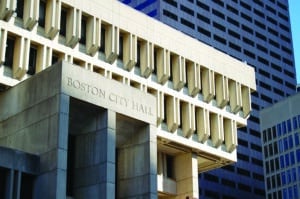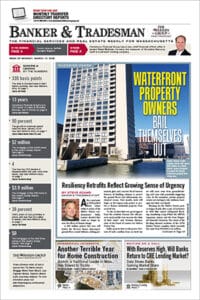The Boston Zoning Commission Chair has been removed by Mayor Michelle Wu just a month after the board failed to approve new regulations discouraging the use of fossil fuel building systems in new developments.
Jay Hurley was notified this month by a city hall official that he had been removed from the commission, Contrarian Boston reports, citing Hurley himself.
Contrarian Boston is a newsletter published independently by Scott Van Voorhis, a freelance columnist for Banker & Tradesman.
The Zoning Commission vote on Aug. 15 would have been the final step approving the zoning changes applying to fossil fuel-based building systems starting in July 2025. Four of the 10 commissioners voted against the proposal, falling short of the needed two-thirds majority.
In a statement that did not address the reasons for Hurley’s replacement, the mayor’s office issued a statement that it has “been steadily filling seats on the many city boards and commissions, and are still catching up on some expirations, but our team is working to keep the business of the city moving forward.”
Hurley’s term expired in 2019, according to the Zoning Commission web page, meaning he was staying in a holdover capacity. In 2022, Wu replaced several Zoning Board of Appeal members whose terms had expired.
Hurley was among the commissioners who asked pointed questions of City Hall officials about whether the new requirements would add costs and make it harder to finance developments in Boston. He could not be reached for comment.
City Councilor Ed Flynn submitted a letter urging a delay on the vote, and a “more robust community process” to discuss its potential impacts on development.
The proposal even attracted some opposition from affordable housing developers, which generally have been supportive of the Wu administration’s housing and development policies. Emily Jones, deputy director of Local Initiatives Support Corp. Massachusetts, predicted that the net zero code would increase costs and make it harder for nonprofits to obtain financing for income-restricted housing projects.
The new regulations are among the most aggressive in the nation designed to cut carbon emissions from the building sector, which is responsible for more than two-thirds of greenhouse gas emissions according to city research.
The Boston Planning & Development Agency board approved the new regulations in June, leaving the Zoning Commission the final barrier to approval.
Hurley was the Greater Boston Labor Council AFL-CIO’s nominated appointee to the board and a long-time member. Along with Hurley, commissioners Drew Leff, Michael DiMella and David Marr opposed the changes.
“If you can’t vote your conscience, what are you going to do?” Hurley told Contrarian Boston. “You might as well not have the [zoning] board.”
After the August vote, Wu’s office said it would resubmit the proposal “to address some of the concerns commissioners raised.”
The zoning change would apply to projects with at least 15 housing units or 20,000 square feet of construction, and additions to existing buildings of 50,000 square feet or more.
Under the rejected regulations, developers could comply by using electric or solar utility systems, purchasing renewable energy credits or submitting alternative compliance payments to the city’s equitable emissions investment fund which supports decarbonization in environmental justice communities.
According to a BPDA analysis, the cost of compliance payments would raise operational costs at a typical property by 5.5 percent. The proposed code set later deadlines for higher-energy building types such as labs, which would have been given until 2035 to comply, while hospitals and manufacturing buildings faced a 2045 deadline.
Editor’s note 2:25 p.m. Sept. 16, 2024: This report has been updated with a statement from the mayor’s office.









